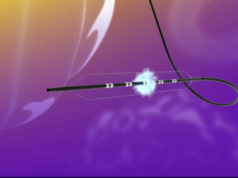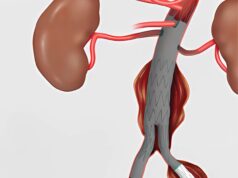
Vascular News – North America talks to Dr Enrico Ascher, Professor of Surgery at Mount Sinai School of Medicine, Director of Vascular Surgery at Maimonides Medical Center in Brooklyn, New York, and current President of the Society for Vascular Surgery (SVS), about life in medicine, his obligations to the SVS and his hopes for the future of the speciality…
“I never had any idea I would have a career in medicine. Nobody in my family was a doctor. My mother gave us two options in life – either go to work early or become a doctor. So my two sisters and my brother and I decided not to go to work early and go into medicine.
“The one event that did influence me was probably when my uncle lost his leg, above the knee and I became interested in reconstructive medicine and trying to save limbs became one of my goals.”
Great Influences
After graduating from the Federal University of Rio De Janeiro in Brazil. He received his residency training at New York Medical College, and later completed his fellowship at Montefiore Hospital, in New York, under Frank Veith. “Frank Veith was the best teacher and showed me how to save limbs – he has been a great influence throughout my career, both academically and professionally.”
“From there I moved to Brooklyn to become Chief of Vascular Surgery at Maimonides Medical Center, best known for performing the first human heart transplant in North America and developing the pacemaker and IVC filter as well as several other great innovations. It is a great institution. It is very supportive of everything I have wanted to do from teaching to research.”
Ascher is perhaps best known for his roles in several vascular societies, a role of which he very proud, but also feels obliged, “It is something I feel is an obligation for every vascular surgeon to be involved in their society, whether it be as a contributor of science or in the political arena – I try to do both.”
Endovascular Specialists
And it is in the political arena that Ascher has been particularly prevalent. “Vascular surgeons have a lot of competition. We have a lot of forces working against us – but we have a lot of forces working for us. A factor working for us is our own upbringing – we have been raised as hard workers, to be aggressive and persistent and we have taken on every challenge successfully. Fifteen years ago we were not dreaming about becoming endovascular specialists – now, I believe we are the leaders in endovascular techniques. We are now developing endovascular techniques – and the Society is the means by which one can fulfil his or her goals.”
In his role as President of the Society for Vascular Surgery (SVS), Ascher has been outspoken regarding the need for vascular surgeons to learn new techniques and skills. “Of course the rise of endovascular techniques has become very popular and as the technologies have advanced, certainly in many areas, it has replaced open surgery. As a result vascular surgeons have evolved, they have adapted themselves and have been the major contributors as to understanding how endovascular techniques work and the natural history of the disease being treated by endovascular techniques.”
“So I think that we have been part of the evolution, rather than being a stumbling block or being in competition with other specialists. We have really embraced the techniques. On the other hand, I don’t think we should sit idle believing we have already accomplished everything we can accomplish. Rather would should use what we know as a springboard to move on to other things. We should use the arterial system as a vehicle to reach other goals – for two reasons. Other specialists are encroaching on endovascular techniques, like cardiac surgeons, who have a diminished clinical practice will try to move onto endovascular. One way out is to treat the end organs and not just the channels that lead to the end organs. So we should be learning how to uterine-embolisations, chemo-embolisations and perhaps coronary angiograms in the near future.”
“At this time, the Society is working on a training paradigm that has to be primarily evaluated by the Association of Program Directors of Vascular Surgery. At this stage we are basically implementing courses so people can be introduced to the concept of extended endovascular techniques.”
“I believe interventional radiologists will have to be our partners in the near future. In some areas they already are and always have been, it is just a matter of accepting us as vascular specialists. It is not a surprise – as it is within our natural history (as vascular surgeons) to go on and do things that were thought we impossible to achieve.”
“There is always going to be competition and there are a lot of synonyms, “turf war” or “encroaching” – as along as the competition is healthy it is good a thing. What I mean by healthy competition is that the people that are doing the procedures have to be well trained. If they are well trained, they should have the right to do the procedures, no matter what their background. If the vascular surgeons are not well trained they should not be doing endovascular technique.”
“In an open market, the surgeon who has the best results is going to be the one with the largest practice. However, I think vascular surgeons have not marketed themselves very well. The ‘competition’ is pointed to the fact that we are ‘cutting surgeons’ who are not willing to accept minimally-invasive techniques – but the truth is the exact opposite. Most of our papers now are based on endovascular techniques. So here we are introducing new techniques in endovascular surgery and the competition is saying we do not offer endovascular surgery.”
Effective Marketers
“Therefore, I said recently that we should put at least 5% of our income into marketing ourselves effectively. It is the option of the patient – they now have the ability to go to several different specialists who can give them different options in an unbiased way. They can give them an open technique option, an endovascular option or a non-operative or non-procedural option – and vascular surgeons are the only ones who can provide those options without bias. The radiologists and interventional cardiologist are going to be pushing for an endovascular technique – they would not offer the open option, even though it might be a better option for that particular patient in the long term. Therefore, we just have to let people know that we can be the best providers of vascular medicine at present. Now, if the radiologists are learning vascular medicine and open techniques then they can also do the same thing. As long as they are well trained, I will have nothing against it. I am for a well trained specialist – rather than forcing someone via a specialty.”
Greater International Co-operation
“I would like to increase the relationship between the European Society for Vascular Surgery (ESVS) and the SVS. I have already offered them a symposium at our SVS meeting and I am pleased to say the council has agreed. And we will have an SVS symposium within the ESVS. It will increase interaction and we will have a lot of fun. It will be mutually beneficial.”
“The Europeans are very much ahead in so many areas, including endovascular, and they can share their experiences, they have developed several techniques that are very exciting. We don’t want paper presentations but lectures in an open forum about what is new so we can learn – and vice versa, we are also doing a lot of exciting things.”
“I would also like to increase our relationship with the South Americans. The Brazilian Vascular Society has over 1,500 members, and I have just being honoured with a gold medal for services to that Society and I would like to increase the relationship and co-operation between the South Americans, Europeans and the North Americans, and hopefully, the Asians. We are all one and it would open more doors and help create a similar structure among the major societies.”
Independence for Vascular Surgery
“One of the major problems across the world it that vascular surgery has never been defined as an independent specialty. Even in the United States, we are still not independent; we do not have an independent board. Our board is part of the General Surgery Board and we are within their structure so that has also hindered our marketing ability as they see us as part of surgery and not as a part of a vascular specialty. So one of my goals is to achieve independent status.”
“We have already achieved one step which was the primary certificate, so we no longer have to do general surgery to become a vascular surgeon. But that is not enough – our goal is to achieve complete independence. Similar to the one achieved by the orthopedic surgeons and cardiac surgeons.”
“So far we have been denied because the American Board of Surgery want control. They are afraid that if the let go of vascular surgery other specialties will want the same thing. But we are the most mature specialists – the fact that we do vascular medicine and intervention, so we are far away from general surgery. It is like not letting go of your best employee. Once independence is achieved many things will fall into place.”
“I think vascular surgery is a very exciting future, it offers a variety of procedures and the future is very bright. People are jealous of us – we just need to recognise that we have a great thing in our hands – we need to be optimistic.”
Outside of Surgery
Outside of the operating room and away from his involvement in various societies – how does Dr Ascher relax? “Well, actually I find the best way to relax is to during surgery. There if no better time to relax but in the operating room, I relax better in the operating room than anywhere else and as a result I can promise you I have not taken more than one week holiday in the past 15 years.”
“I also like to write papers, I like to be involved in all areas in vascular surgery – politically, academically and clinically. I also like to walk, but not run. I walk about 10-15 miles a week. Occasionally I play tennis. I like to travel, which is why I go to so many meetings and I also like to read about the history of the US and its wars.”












